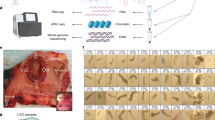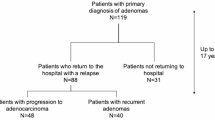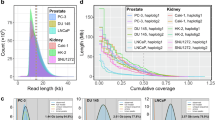Summary
Comparative genomic hybridization (CGH) is used to detect amplified and/or deleted chromosomal regions in tumours by mapping their locations on normal metaphase chromosomes. Forty-five sporadic colorectal carcinomas were screened for chromosomal aberrations using direct CGH. The median number of chromosomal aberrations per tumour was 7.0 (range 0–19). Gains of 20q (67%) and losses of 18q (49%) were the most frequent aberrations. Other recurrent gains of 5p, 6p, 7, 8q, 13q, 17q, 19, X and losses of 1p, 3p, 4, 5q, 6q, 8p, 9p, 10, 15q, 17p were found in > 10% of colorectal tumours. High-level gains (ratio > 1.5) were seen only on 8q, 13q, 20 and X, and only in DNA aneuploid tumours. DNA aneuploid tumours had significantly more chromosomal aberrations (median number per tumour of 9.0) compared to diploid tumours (median of 1.0) (P < 0.0001). The median numbers of aberrations seen in DNA hyperdiploid and highly aneuploid tumours were not significantly different (8.5 and 11.0 respectively; P = 0.58). Four tumours had no detectable chromosomal aberrations and these were DNA diploid. A higher percentage of tumours from male patients showed Xq gain and 18q loss compared to tumours from female patients (P = 0.05 and 0.01 respectively). High tumour S phase fractions were associated with gain of 20q13 (P = 0.03), and low tumour apoptotic indices were associated with loss of 4q (P = 0.05). Tumours with TP53 mutations had more aberrations (median of 9.0 per tumour) compared to those without (median of 2.0) (P = 0.002), and gain of 8q23–24 and loss of 18qcen-21 were significantly associated with TP53 mutations (P = 0.04 and 0.02 respectively). Dukes’ C/D stage tumours tended to have a higher number of aberrations per tumour (median of 10.0) compared to Dukes’ B tumours (median of 3.0) (P = 0.06). The low number of aberrations observed in DNA diploid tumours compared to aneuploid tumours suggests that genomic instability and possible growth advantages in diploid tumours do not result from acquisition of gross chromosomal aberrations but rather from selection for other types of mutations. Our study is consistent with the idea that these two groups of tumours evolve along separate genetic pathways and that gross genomic instability is associated with TP53 gene aberrations.
Similar content being viewed by others
Article PDF
Change history
16 November 2011
This paper was modified 12 months after initial publication to switch to Creative Commons licence terms, as noted at publication
References
Aaltonen, L. A., Peltomaki, P., Leach, F. S., Sistonen, P., Pylkkanen, L., Mechklin, J-P, Jarvinen, H., Powell, S. M., Jen, J., Hamilton, S. R., Petersen, G. M., Kinzler, K. W., Vogelstein, B. & de la Chapelle, A. (1993). Clues to the pathogenesis of familial colorectal cancer. Science 260: 812–816.
Andersen, S. N., Lovig, T., Breivik, J., Lund, E., Gaudernack, G., Meling, G. I. & Rognum, T. O. (1997). K-ras mutations and prognosis in large-bowel carcinomas. Scand J Gastroenterol 32: 62–69.
Arnold, N., Hagele, L., Walz, L., Schempp, W., Pfisterer, J., Bauknecht, T. & Kiechle, M. (1996). Overrepresentation of 3q and 8q material and loss of 18q material are recurrent findings in advanced human ovarian cancer. Genes Chromosomes Cancer 16: 46–54.
Bardi, G., Sukhikh, T., Pandis, N., Fenger, C., Kronborg, O. & Heim, S. (1995). Karyotypic characterization of colorectal adenocarcinomas. Genes Chromosomes Cancer 12: 97–109.
Bauer, K. D., Bagwell, C. B., Giaretti, W., Melamed, M., Zarbo, R. D., Witzig, T. E. & Rabinovitch, P. (1993). Consensus review of the clinical utility of DNA flow cytometry in colorectal cancer. Cytometry 14: 486–491.
Bigner, S. H., Bjerkvig, R., Læarum, O. D., Muhlbaier, L. H. & Bigner, D. D. (1987). DNA content and chromosomes in permanent cultured cell lines derived from malignant human gliomas. Anal Quant Cytol Histol 9: 435–444.
Bodmer, W. F., Bailey, C. J., Bodmer, J., Bussey, H. J., Ellis, A., Gorman, P., Lucibello, F. C., Murday, V. A., Rider, S. H., Scrambler, P., Sheer, D., Solomon, E. & Spurr, N. K. (1987). Localization of the gene for familial adenomatous polyposis on chromosome 5. Nature 328: 614–616.
Bos, J. L. (1989). Ras oncogenes in human cancer: a review. Cancer Res 49: 4682–4689.
Campo, E., de la Calle-Martin, O., Miquel, R., Palacin, A., Romero, M., Fabregat, V., Vives, J., Cardesa, A. & Yague, J. (1991). Loss of heterozygosity of p53 gene and p53 protein expression in human colorectal carcinomas. Cancer Res 51: 4436–4442.
Cher, M. L., MacGrogan, D., Bookstein, R., Brown, J. A., Jenkins, R. B. & Jensen, R. H. (1994). Comparative genomic hybridization, allelic imbalance, and fluorescence in situ hybridization on chromosome 8 in prostate cancer. Genes Chromosomes Cancer 11: 153–162.
Cusick, E. L., Milton, J. I. & Ewen, S. W. B. (1990). The resolution of aneuploid DNA stem lines by flow cytometry: limitations imposed by the coefficient of variation and the percentage of aneuploid nuclei. Anal Cell Pathol 2: 139–148.
De Angelis, P., Stokke, T., Smedshammer, L., Lothe, R. A., Meling, G. I., Rofstad, M., Chen, Y. & Clausen, O. P. F. (1993). p53 expression is associated with a high degree of tumor DNA aneuploidy and incidence of p53 gene mutation, and is localized to the aneuploid component in colorectal carcinomas. Int J Oncol 3: 305–312.
De Angelis, P., Stokke, T., Smedshammer, L., Lothe, R. A., Lehne, G., Chen, Y. & Clausen, O. P. F. (1995). P-glycoprotein is not expressed in a majority of colorectal carcinomas and is not regulated by mutant p53 in vivo. Br J Cancer 72: 307–311.
De Angelis, P. M., Stokke, T. & Clausen, O. P. F. (1997). NO38 expression and nucleolar counts are correlated with cellular DNA content but not with proliferation parameters in colorectal carcinomas. J Clin Pathol Mol Pathol 50: 201–208.
De Angelis, P. M., Stokke, T., Thorstensen, L., Lothe, R. A. & Clausen, O. P. F. (1998). Apoptosis and expression of Bax, Bcl-x, and Bcl-2 apoptotic regulatory proteins in colorectal carcinomas, and associations with p53 genotype/phenotype. J Clin Pathol Mol Pathol 51: 254–261.
Delattre, O., Law, D. J., Remvikos, Y., Sastre, X., Feinberg, A. P., Olschwang, S., Melot, T., Salmon, R. J., Validire, P. & Thomas, G. (1989). Multiple genetic alterations in distal and proximal colorectal cancer. Lancet 2: 353–356.
Eppert, K., Scherer, S. W., Ozcelik, H., Pirone, R., Hoodless, P., Kim, H., Tsui, L. C., Bapat, B., Gallinger, S., Andrulis, I. L., Thomsen, G. H., Wrana, J. L. & Attisano, L. (1996). MADR2 maps to 18q21 and encodes a TGFβ-regulated MAD-related protein that is functionally mutated in colorectal carcinoma. Cell 86: 543–552.
Fearon, E. R., Hamilton, S. R. & Vogelstein, B. (1987). Clonal analysis of human colorectal tumors. Science 238: 193–196.
Fearon, E. R. & Vogelstein, B. (1990). A genetic model for colorectal tumorigenesis. Cell 61: 759–767.
Giaretti, W. (1993). A model on the origin and evolution of DNA aneuploidy. Int J Oncol 2: 165–171.
Giaretti, W., Monaco, R., Pujic, N., Rapallo, A., Nigro, S. & Geido, E. (1996). Intratumor heterogeneity of K-ras2 mutations in colorectal adenocarcinomas. Association with degree of DNA aneuploidy. Am J Pathol 149: 1–9.
Hahn, S. A., Schutte, M., Hoque, A. T., Moskaluk, C. A., da Costa, L. T., Rozenblum, E., Weinstein, C. L., Fischer, A., Yeo, C. J., Hruban, R. H. & Kern, S. E. (1996). DPC4, a candidate tumor suppressor gene at human chromosome 18q21.1. Science 271: 350–353.
Heselmeyer, K., Macville, M., Schrock, E., Blegen, H., Hellstrom, A. C., Shah, K., Auer, G. & Ried, T. (1997). Advanced-stage cervical carcinomas are defined by a recurrent pattern of chromosomal aberrations revealing high genetic instability and a consistent gain of chromosome arm 3q. Genes Chromosomes Cancer 19: 233–240.
Hiddemann, W., Schumann, J., Andreeff, M., Barlogie, B., Herman, C. J., Leif, R. C., Mayall, B. H., Murphy, R. F. & Sandberg, A. A. (1984). Convention on nomenclature for DNA cytometry. Cytometry 5: 445–446.
Houlston, R. S. & Tomlinson, I. P. M. (1997). Genetic prognostic markers in colorectal cancer. J Clin Pathol Mol Pathol 50: 281–288.
Ilyas, M. & Tomlinson, I. P. M. (1996). Genetic pathways in colorectal cancer. Histopathology 28: 389–399.
Kallioniemi, A., Kallioniemi, O-P, Sudar, D., Rutovitz, D., Gray, J. W., Waldman, F. & Pinkel, D. (1992). Comparative genomic hybridization for molecular cytogenetic analysis of solid tumors. Science 258: 818–821.
Kallioniemi, A., Kallioniemi, O. P., Citro, G., Sauter, G., DeVries, S., Kerschmann, R., Caroll, P. & Waldman, F. (1995). Identification of gains and losses of DNA sequences in primary bladder cancer by comparative genomic hybridization. Genes Chromosomes Cancer 12: 213–219.
Kallioniemi, O. P., Kallioniemi, A., Piper, J., Isola, J., Waldman, F., Gray, J. W. & Pinkel, D. (1994). Optimizing comparative genomic hybridization for analysis of DNA sequence copy number changes in solid tumors. Genes Chromosomes Cancer 10: 231–243.
Karhu, R., Kahkonen, M., Kuukasjarvi, T., Pennanen, S., Tirkkonen, M. & Kallioniemi, O. (1997). Quality control of CGH: impact of metaphase chromosomes and the dynamic range of hybridization. Cytometry 28: 198–205.
Kikuchi-Yanoshita, R., Konishi, M., Ito, S., Seki, M., Tanaka, K., Maeda, Y., Iino, H., Fukayama, M., Koike, M., Mori, T., Sakuraba, H., Fukunari, H., Iwama, T. & Miyaki, M. (1992). Genetic changes of both p53 alleles associated with the conversion from colorectal adenoma to early carcinoma in familial adenomatous polyposis and non-familial adenomatous polyposis patients. Cancer Res 52: 3965–3971.
Korn, W. M., Oide Weghuis, D. E., Suijkerbuijk, R. F., Schmidt, U., Otto, T., du Manoir, S., Geurts van Kessel, A., Harstrick, A., Seeber, S. & Becher, R. (1996). Detection of chromosomal DNA gains and losses in testicular germ cell tumors by comparative genomic hybridization. Genes Chromosomes Cancer 17: 78–87.
Lothe, R. A., Peltomaki, P., Meling, G. I., Aaltonen, L. A., Nystrom-Lahti, M., Pylkkanen, L., Heimdal, K., Andersen, T. I., Møller, P., Rognum, T. O., Fosså, S. D., Haldorsen, T., Langmark, F., Brøgger, A., de la Chapelle, A. & Børresen, A-L (1993). Genomic instability in colorectal cancer: Relationship to clinicopathological variables and family history. Cancer Res 53: 5849–5852.
MacGrogan, D., Pegram, M., Slamon, D. & Bookstein, R. (1997). Comparative mutational analysis of DPC4 (Smad4) in prostatic and colorectal carcinomas. Oncogene 15: 1111–1114.
Meling, G. I., Lothe, R. A., Børresen, A-L, Graue, C., Hauge, S., Clausen, O. P. F. & Rognum, T. O. (1993). The TP53 tumour suppressor gene in colorectal carcinomas. II. Relation to DNA ploidy pattern and clinicopathological variables. Br J Cancer 67: 93–98.
Miyaki, M., Konishi, M., Kikuchi-Yanoshita, R., Enomoto, M., Igari, T., Tanaka, K., Muraoka, M., Takahashi, H., Amada, Y., Fukuyama, M., Maeda, Y., Iwama, T., Mishima, Y., Mori, T. & Koike, M. (1994). Characteristics of somatic mutation of the adenomatous polyposis coli gene in colorectal tumors. Cancer Res 54: 3011–3020.
Miyashita, T. & Reed, J. (1995). Tumor suppressor p53 is a direct transcriptional activator of the human bax gene. Cell 80: 293–299.
Muleris, M., Salmon, R. J. & Dutrillaux, B. (1990). Cytogenetics of colorectal adenocarcinomas. Cancer Genet Cytogenet 46: 143–156.
Nakao, K., Shibusawa, M., Tsunoda, A., Yoshizawa, H., Murakami, M., Kusano, M., Uesugi, N. & Sasaki, K. (1998). Genetic changes in primary colorectal cancer by comparative genomic hybridization. Surg Today 28: 567–569.
Offerhaus, A., Johan, G., Defeyter, E. P., Cornelisse, C. J., Tersmette, K. W., Floyd, J., Kern, S. E., Vogelstein, B. & Hamilton, S. R. (1992). The relationship of DNA aneuploidy to molecular genetic alterations in colorectal carcinoma. Gastroenterology 102: 1612–1619.
Powell, S. M., Zilz, N., Beazer-Barclay, Y., Bryan, T. M., Hamilton, S. R., Thibodeau, S. N., Vogelstein, B. & Kinzler, K. W. (1992). APC mutations occur early during colorectal tumorigenesis. Nature 359: 235–237.
Rampino, N., Yamamoto, H., Ionov, Y., Li, Y., Sawai, H., Reed, J. C. & Perucho, M. (1997). Somatic frameshift mutations in the BAX gene in colon cancers of the microsatellite mutator phenotype. Science 275: 967–969.
Remvikos, Y., Laurent-Puig, P., Salmon, R. J., Frelat, G., Dutrillaux, B. & Thomas, G. (1990). Simultaneous monitoring of p53 protein and DNA content of colorectal adenocarcinomas by flow cytometry. Int J Cancer 45: 450–456.
Remvikos, Y., Vogt, N., Muleris, M., Salmon, R. J., Malfoy, B. & Dutrillaux, B. (1995). DNA-repeat instability is associated with colorectal cancer presenting minimal chromosomal rearrangements. Genes Chromosomes Cancer 12: 272–276.
Ried, T., Knutzen, R., Steinbeck, R., Blegen, H., Schrock, E., Heselmeyer, K., du Manoir, S. & Auer, G. (1996). Comparative genomic hybridization reveals a specific pattern of chromosomal gains and losses during the genesis of colorectal tumors. Genes Chromosomes Cancer 15: 234–245.
Rognum, T. O., Lund, E., Meling, G. I. & Langmark, F. (1991). Near diploid large bowel carcinomas have better five-year survival than aneuploid ones. Cancer 68: 1077–1081.
Shackney, S. E. & Shankey, T. V. (1997). Common patterns of genetic evolution in human solid tumors. Cytometry 29: 1–27.
Shackney, S. E., Smith, C. A., Miller, B. W., Burholt, D. R., Murtha, K., Giles, H. R., Ketterer, D. M. & Pollice, A. A. (1989). Model for the genetic evolution of human solid tumors. Cancer Res 49: 3344–3354.
Solomon, E., Voss, R., Hall, V., Bodmer, W. F., Jass, J. R., Jeffreys, A. J., Lucibello, F. C., Patel, I. & Rider, S. H. (1987). Chromosome 5 allele loss in human colorectal carcinomas. Nature 328: 616–619.
Takagi, Y., Kohmura, H., Futamura, M., Kida, H., Tanemura, H., Shimokawa, K. & Saji, S. (1996). Somatic alterations of the DPC4 gene in human colorectal cancers in vivo. Gastroenterology 111: 1369–1372.
Tanner, M. M., Tirkkonen, M., Kallioniemi, A., Collins, C., Stokke, T., Karhu, R., Kowbel, D., Shadravan, F., Hintz, M., Kuo, W-L, Waldman, F. M., Isola, J. J., Gray, J. W. & Kallioniemi, O-P (1994). Increased copy number at 20q13 in breast cancer: defining the critical region and exclusion of candidate genes. Cancer Res 54: 4257–4260.
Thiagalingam, S., Lengauer, C., Leach, F. S., Schutte, M., Hahn, S. A., Overhauser, J., Willson, J. K., Markowitz, S., Hamilton, S. R., Kern, S. E., Kinzler, K. W. & Vogelstein, B. (1996). Evaluation of candidate tumour suppressor genes on chromosome 18 in colorectal cancers. Nat Genet 13: 343–346.
Tirkkonen, M., Tanner, M., Karhu, R., Kallioniemi, A., Isola, J. & Kallioniemi, O-P (1998). Molecular cytogenetics of primary breast cancer by CGH. Genes Chromosomes Cancer 21: 177–184.
Tribukait, B., Granberg-Ohman, I. & Wijkstrom, H. (1986). Flow cytometric DNA and cytogenetic studies in human tumors: a comparison and discussion of the differences in modal values obtained by the two methods. Cytometry 7: 194–199.
Vindeløv, L. L., Christensen, I. J. & Nissen, N. I. (1983). A detergent-trypsin method for the preparation of nuclei for flow cytometric DNA analysis. Cytometry 3: 323–327.
Vogelstein, B., Fearon, E. R., Hamilton, S. R., Kern, S. E., Preisinger, A. C., Leppert, M., Nakamura, Y., White, R., Smits, A. M. M. & Bos, J. L. (1988). Genetic alterations during colorectal tumor development. N Engl J Med 319: 525–532.
Author information
Authors and Affiliations
Rights and permissions
From twelve months after its original publication, this work is licensed under the Creative Commons Attribution-NonCommercial-Share Alike 3.0 Unported License. To view a copy of this license, visit http://creativecommons.org/licenses/by-nc-sa/3.0/
About this article
Cite this article
Angelis, P., Clausen, O., Schjølberg, A. et al. Chromosomal gains and losses in primary colorectal carcinomas detected by CGH and their associations with tumour DNA ploidy, genotypes and phenotypes. Br J Cancer 80, 526–535 (1999). https://doi.org/10.1038/sj.bjc.6690388
Received:
Revised:
Accepted:
Published:
Issue date:
DOI: https://doi.org/10.1038/sj.bjc.6690388
Keywords
This article is cited by
-
CHST7 Gene Methylation and Sex-Specific Effects on Colorectal Cancer Risk
Digestive Diseases and Sciences (2019)
-
A temporal shift of the evolutionary principle shaping intratumor heterogeneity in colorectal cancer
Nature Communications (2018)
-
Copy number alterations and allelic ratio in relation to recurrence of rectal cancer
BMC Genomics (2015)
-
Telomere shortening correlates to dysplasia but not to DNA aneuploidy in longstanding ulcerative colitis
BMC Gastroenterology (2014)
-
Next-generation biobanking of metastases to enable multidimensional molecular profiling in personalized medicine
Modern Pathology (2013)



